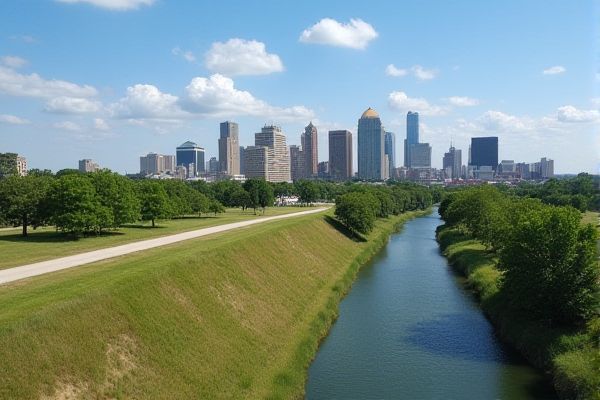
Transportation and commuting in Kansas: Extensive highway system. Moderate traffic congestion. Public transportation availability. Affordable gas prices. Carpool options. Bike-friendly cities. Limited train services. Seasonal driving conditions. Parking availability. Rideshare services.
Extensive highway system
Kansas has an extensive highway system, with over 140,000 miles of roads, including state highways, U.S. and Interstate routes, and the 238-mile Kansas Turnpike, which connects the state's four largest cities and is a critical component of the state's transportation infrastructure. For more detailed insights into Kansas's transportation planning, you can explore the Kansas Long Range Transportation Plan. This comprehensive network plays a vital role in facilitating commerce and daily travel, significantly contributing to the state's economy and quality of life.
Moderate traffic congestion
Kansas City experiences moderate traffic congestion, with average travel times to work being 24.4 minutes, which is relatively short compared to other U.S. cities. According to the Transportation Fact Sheet, roadway fatalities and serious injuries per 100 million vehicle miles traveled are also relatively low.
Public transportation availability
In Kansas, particularly in the Kansas City region, public transportation is readily available through RideKC, offering fixed commuter and express bus routes, microtransit, and paratransit services, connecting Johnson County and other areas to the greater Kansas City metropolitan area. Additionally, various coordinated transit districts and councils provide services across different counties, ensuring comprehensive coverage.
Affordable gas prices
In Kansas, gas prices are relatively affordable, with the current average price for regular unleaded gasoline at $2.675 per gallon, making commuting by vehicle a cost-effective option compared to many other states. For more detailed information, visit the AAA Gas Prices website.
Carpool options
RideshareKC is a free carpool program in Kansas City that connects commuters in several Missouri and Kansas counties, assisting them in finding carpool buddies and alternative transit options like buses, vans, and rentable bikes to reduce costs and carbon emissions, thereby enhancing environmental sustainability. The program requires users to create a profile, specify their routes, and match with compatible carpool partners. To learn more about this initiative, visit the Kansas City Star website.
Bike-friendly cities
Lawrence is the most bikeable city in Kansas with a bike score of 61, followed by cities like Topeka, Manhattan, and Olathe, which offer cyclist-friendly neighborhoods, bike lanes, and extensive trail systems, making them appealing for both commuting and leisurely rides. For more details on these bikeable cities, visit the Redfin blog.
Limited train services
In Kansas, limited train services include freight and passenger rail operations. The state's rail system, comprising 4,216 miles, is primarily managed by Class I railroads such as the Kansas City Southern Railway, with additional services provided by short line and terminal/switching railroads, and limited passenger services like the Amtrak Western Routes, including the Southwest Chief.
Seasonal driving conditions
In Kansas, seasonal driving conditions, particularly in spring, involve adverse weather such as rain, blowing dust, and smoke, requiring drivers to use headlights, slow down, and maintain safe distances to ensure visibility and safety. Drivers must also be cautious of fog, ice, snow, and strong winds, adjusting their driving habits accordingly to avoid hazards and maintain control of their vehicles. For more detailed tips on how to navigate these challenging conditions, visit the Kansas Highway Patrol website.
Parking availability
In Kansas City, parking availability has been adjusted with the elimination of event-based parking fees in the River Market area, while such fees continue in other downtown regions like the Power & Light District. The city is also implementing an employee discount program for lots and garages in the River Market to encourage longer-term parkers to utilize off-street parking. This initiative aims to increase turnover and the availability of street parking for customers, as detailed on the Kansas City Event Parking Fees webpage. By focusing on sustainable parking solutions, Kansas City hopes to enhance the overall accessibility and convenience for both residents and visitors.
Rideshare services
IRIS is an innovative app-based, on-demand transit service operating in Kansas City, MO. This service is a collaborative effort involving the Kansas City Area Transportation Authority, zTrip, and RideCo. It offers convenient rides within a quarter-mile of requested locations, effectively connecting users to regular RideKC bus services. For more detailed information, you can visit the official RideKC website which provides a comprehensive rider guide to maximally utilize this service.
